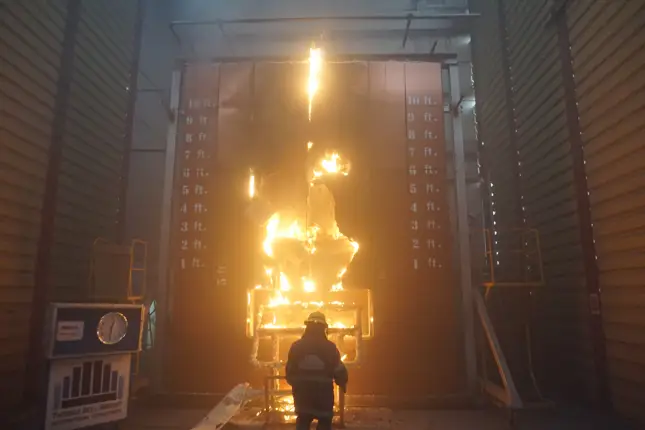At TBW, we have reliably tested more than 12,000 products and assemblies. Our experienced and reliable team has extensive knowledge in adhering to international standards and regulations.
What is Fire Testing?
Fire testing is a process that involves running a test as per a published or ad-hoc test method to evaluate a certain product or assembly. A detailed test report is produced to explain the results pertaining to the test sample. Depending on the test standard, a classification could also interpolated based on the test data.
The importance of fire testing is so that authorities can verify that assemblies used in buildings, or industrial locations where fire must be contained or excluded, meet the specified fire separation time criteria defined by building codes.
This allows people to vacate the building, allows time for firefighters to reach the scene, and minimises losses when a fire occurs.

Our Fire Testing Services

Resistance
The key strategy in delivering Fire Safety in Buildings is called Passive Fire Protection. It works by dividing parts of a building into compartments, each of which should contain a fire for a specified length of time. For example, a fire in a hotel room should be contained by the corridor wall, and a fire should not be able to spread to an exit stair. This type of fire performance is called Resistance to Fire. The most common elements in this category are fire doors, but the same applies to walls, service penetrations, garbage chutes, ceilings/floors etc.

Reaction
Passive Fire protection strategies also aim to limit the ignition and spread of a fire. Grouped together as Reaction to Fire testing, this typically checks finishes but includes particularly insulation materials. It also applies to finishes, flooring, linings, interior panels, household furniture, and so on. The idea is that the material must not ignite or encourage the fire to spread or generate a lot of smoke. Often many of these tests assist in arriving at easily communicable classifications, like the European Classifications as per EN 13501-1, popularly known as Euro-Classes, or the American Classification from the International Building Code based on the test results of ASTM E84 tests conducted in a Steiner Tunnel. We also have a Cone Calorimeter which helps in R&D and investigation testing.

Propagation
This is a test that relates to building façades. In recent decades façade systems have evolved which use flammable or combustible components, and tests for full systems have evolved to keep them safe. Our testing is conducted in accordance with NFPA 285 and BS8414. In the region, many cladding materials like Aluminium Composite Panels (ACP) which have been extensively used in the past, previously had a core that may or may not contain a fire retardant. With newer and stricter regulations in countries like UAE, more and more manufacturers have evolved cladding materials that are less combustible.
Often many of these tests assist in arriving at easily communicable classifications, like the European Classifications as per EN 13501-1, popularly known as Euro-Classes, or the American Classification from the International Building Code based on the test results of ASTM E84 tests conducted in a Steiner Tunnel. We also have a Cone Calorimeter which helps in R&D and investigation testing.
Why is Fire Testing Important?
In order to assure that buildings have implemented strategies to ensure, small fire incidents will not grow into large fire accidents, building materials need to perform in a predictable manner. This is assessed by creating fire conditions in a laboratory to evaluate and report how these building materials behave. Fire testing and various assurance collateral are often pre-requisites to certify, sell or approve building materials.
Fire testing is also closely linked with research and development. Following testing, manufacturers can identify areas that need improvement or innovation. This continuous improvement process enables the latest technologies and techniques to be utilised resulting in more effective fire prevention and protection.

Why Choose TBW For Fire Testing?
At TBW, we are accredited to a wide range of European, American, Marine and ISO test methods that evaluate Resistance, Ignitability, Combustibility, Heat Release Ratios, Fire Propagation, etc.
Our team of experts have conducted more than 12,000 tests meeting international standards and regulations as set by the UAE, India, UK, USA, and EU, offering a comprehensive range of fire testing services.
We are committed to accuracy and safety to ensure that our clients can trust in the reliability and performance of our fire testing services.
Excellent turnaround times from enquiry stage to testing stage to report delivery.
